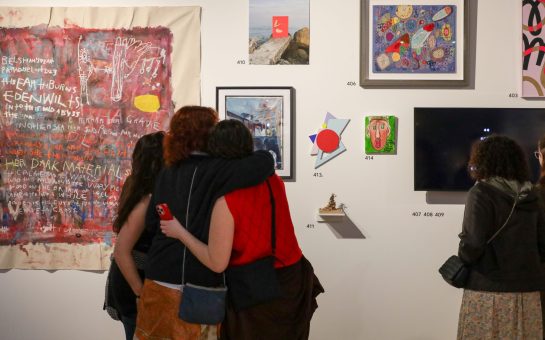To twist an infamous Orwell line it could be said that all productions of Animal Farm are equal…but some are clearly more equal than others.
Despite the simplest of costumes and a minimal set, the talent on display shone through in a gripping theatrical adaptation George Orwell’s classic novel at Hyde Festival Theatre.
A collection of boxes to sit on, a ladder used as a perch, an improvised windmill, and a few sacks of grain lying around were all that made up the backdrop.
However, despite the relatively scarce set, from the first moment to the last the audience were taken on a journey through a living, breathing, fully functional (and, of course, dysfunctional) farm.
As the play begins two chickens and a pigeon step into the desolate cow-shed and launch into belting songs that rouse the farm. ‘There is power in a union’ creates a rapturous scene as horses, pigs, donkeys, and dogs bustle from the wings, stirring up the action.
Animal Farm is Orwell’s satirical masterpiece that shows revolutions and the slow encroachment of corruption into the idealistic dreams of the society and Oldham’s Coliseum Studio Theatre and the Academy of Live and Recording Arts North’s production manage to capture the essence of the novel perfectly.
Writing in Tribune in the year of publication, Tosco Fyvel said the story was ‘a political satire with a good deal of point.’
While the USSR may be no more, and Stalin and Trotsky long dead, Orwell’s allegory of the inherent corruption of power is clever, poignant, and altogether disquieting even today.
Spurred on to overthrow Farmer Jones by Major, the animals of Manor Farm soon establish their own community based on animal equality.
This social system, known as animalism, is soon corrupted, however, when the pigs Napoleon (played by Emma Fernell), Squealer (played by Michaela Longden), and Snowball (played by Elinor Dixon) decide that ‘all animals are equal but some animals are more equal than others.’
A hierarchy soon establishes itself, with the pigs at the top and the sheep at the bottom – and chickens, cows, dogs, cats, pigeons, and ravens sandwiched somewhere between the two – and a fearful state of coercion, collusion, propaganda, and eventual brutality becomes increasingly present.
The tale is compellingly told by Cat Formby, Felicity Elder, and Sarah Jane Duncan, who step forward from their roles as farm birds to plug the narrative gaps.
At the end, however, it is Clover the horse (played by Emily McIntosh) who is hit by a theatrical realisation – the pigs are walking on two legs, wearing clothes, and drinking alcohol.
“The creatures outside looked from pig to man, and from man to pig, and from pig to man again; but already it was impossible to say which was which,” she says, as the creatures and the audience look on in reluctant understanding.
Such haunting retrogression, when related to the failure of the Bolshevik Revolution, is truly haunting, and is a definite achievement when carried out with the pathos and anguished fury managed by Ms McIntosh.
As any regular theatre-goer knows, a good story is only half the battle. A good cast is perhaps even more essential in the establishment of audience connection and reciprocation. In this respect, the actors in Animal Farm did not disappoint.
Ms Longden, with her twanging accent, bizarre stride, and disturbing eruptions of snorts and squeals, was a particularly affecting Squealer. Equally impressive, though at the opposite end of the spectrum, was Benedict Shaw, whose bovine docility reinforced his sheepish character perfectly.
Indeed, most of the actors carried out the actions and sounds of their respective animals so well that complicated costumes were rendered superfluous. Ms Formby’s chicken strut was brilliantly evocative, and Charlotte Broadbent, playing Mollie the horse, had a prideful prance worthy of any show horse.
Unfortunately others were too humanistic. Boxer the horse (played by Joe Bateman) had a disarming guilelessness, fully complementing his humble, workaday character; yet his animalistic actions were too few and far between to reassure the audience as to what creature he was playing. Benjamin the donkey (played by Julie Burrow) was also stunted in this respect, which unfortunately weakened her otherwise excellent performance as a characteristically intractable and sullen mule.
Still, the fantastic ingenuousness of the entire production is difficult to fault. Slow-motion battles, songs free of discomfort, perfectly-timed narrative interjections, and performances by actors clearly dedicated to their roles made for fantastic viewing.
Despite his reputation as a bit of a Benjamin himself, Orwell would be proud that his message of the foibles and failings of humanity have been carried forward by such a talented troop of versatile actors.
Image courtesy of Vicky TGAW , with thanks
For more on this story and many others, follow Mancunian Matters on Twitter and Facebook.



